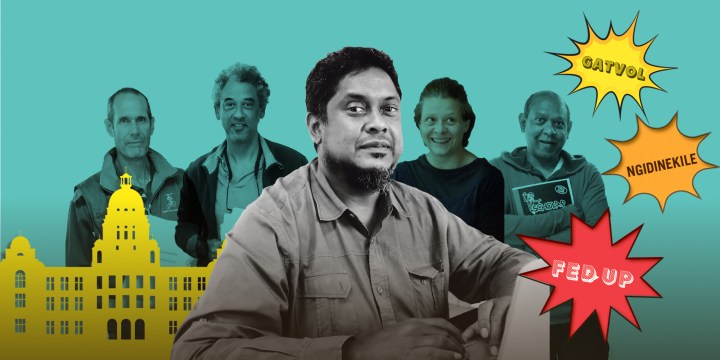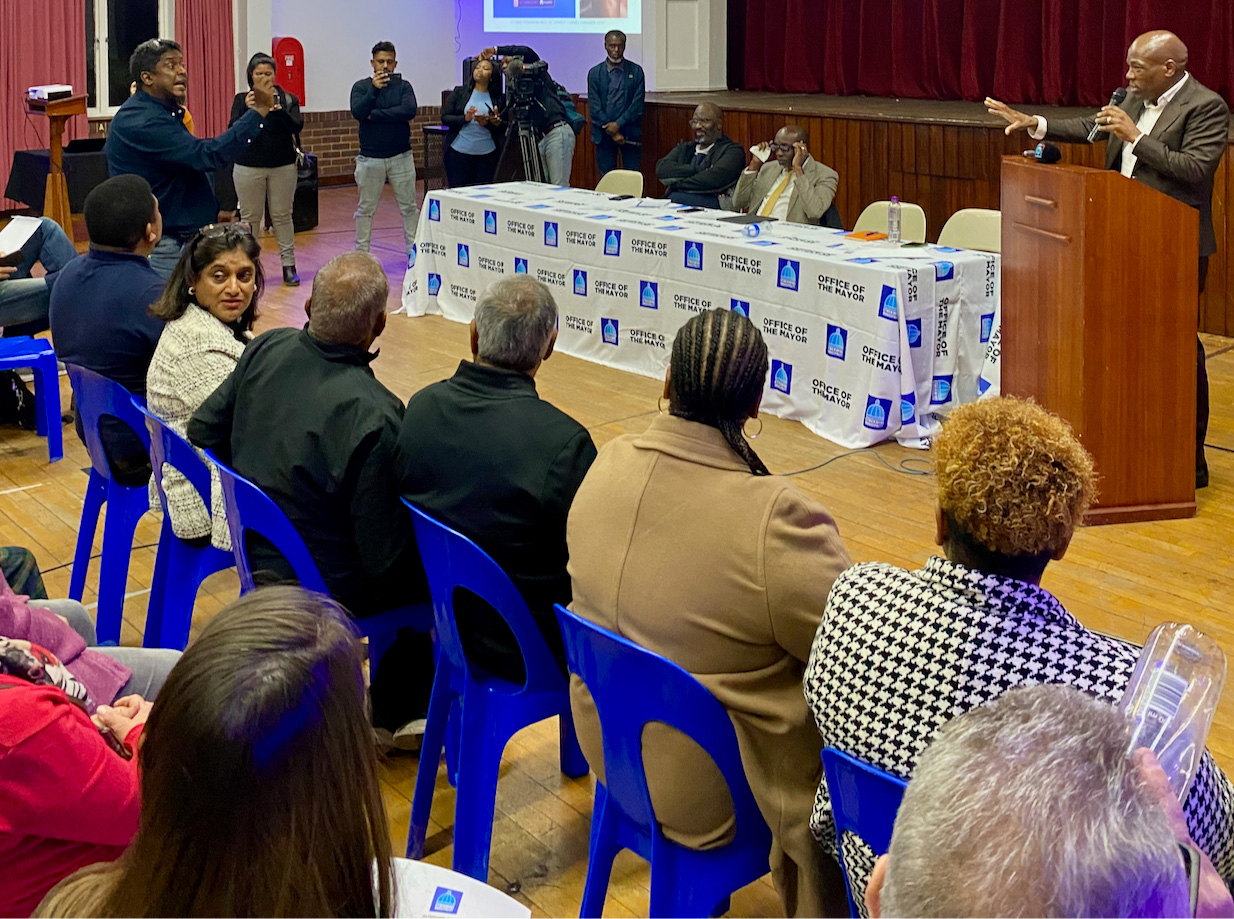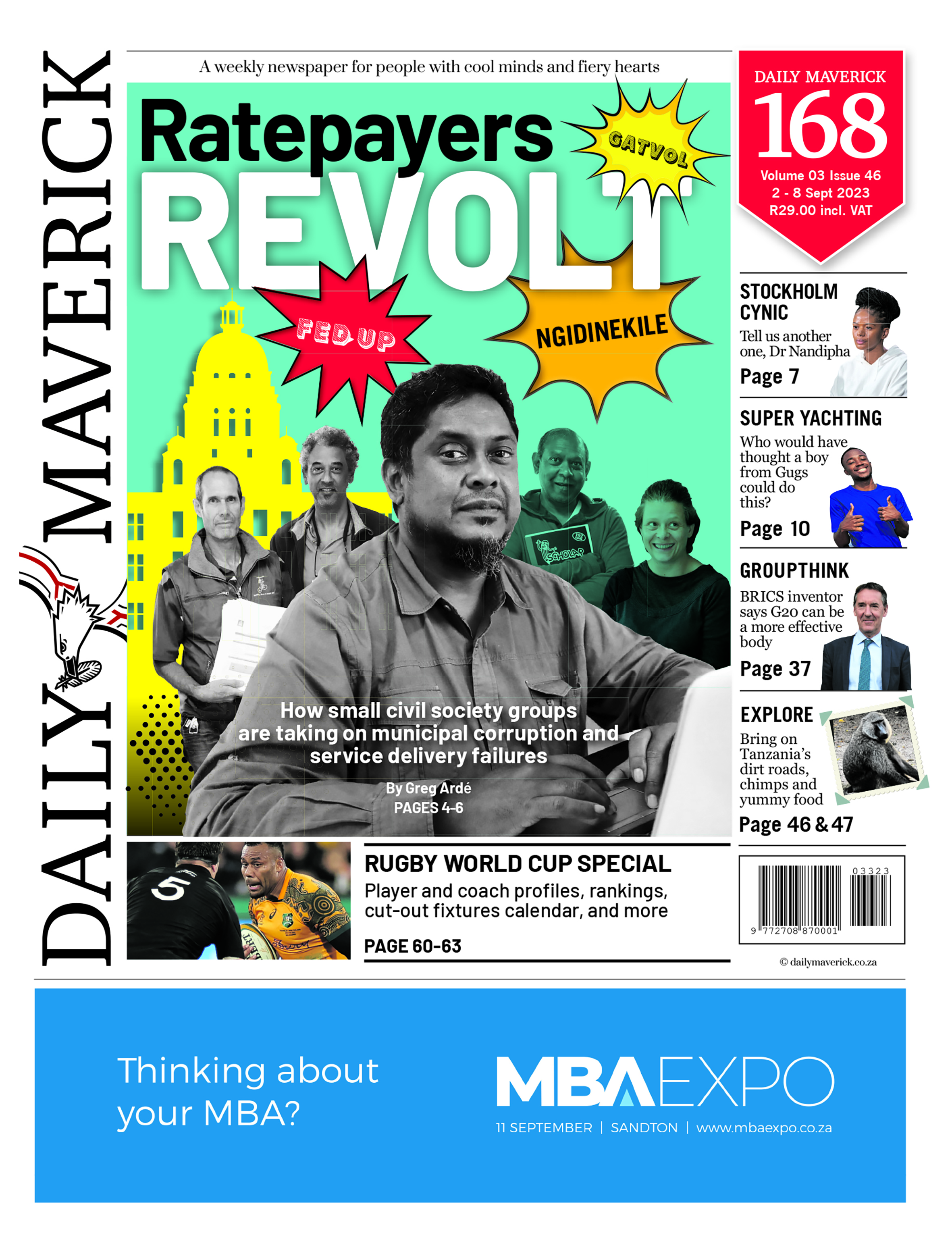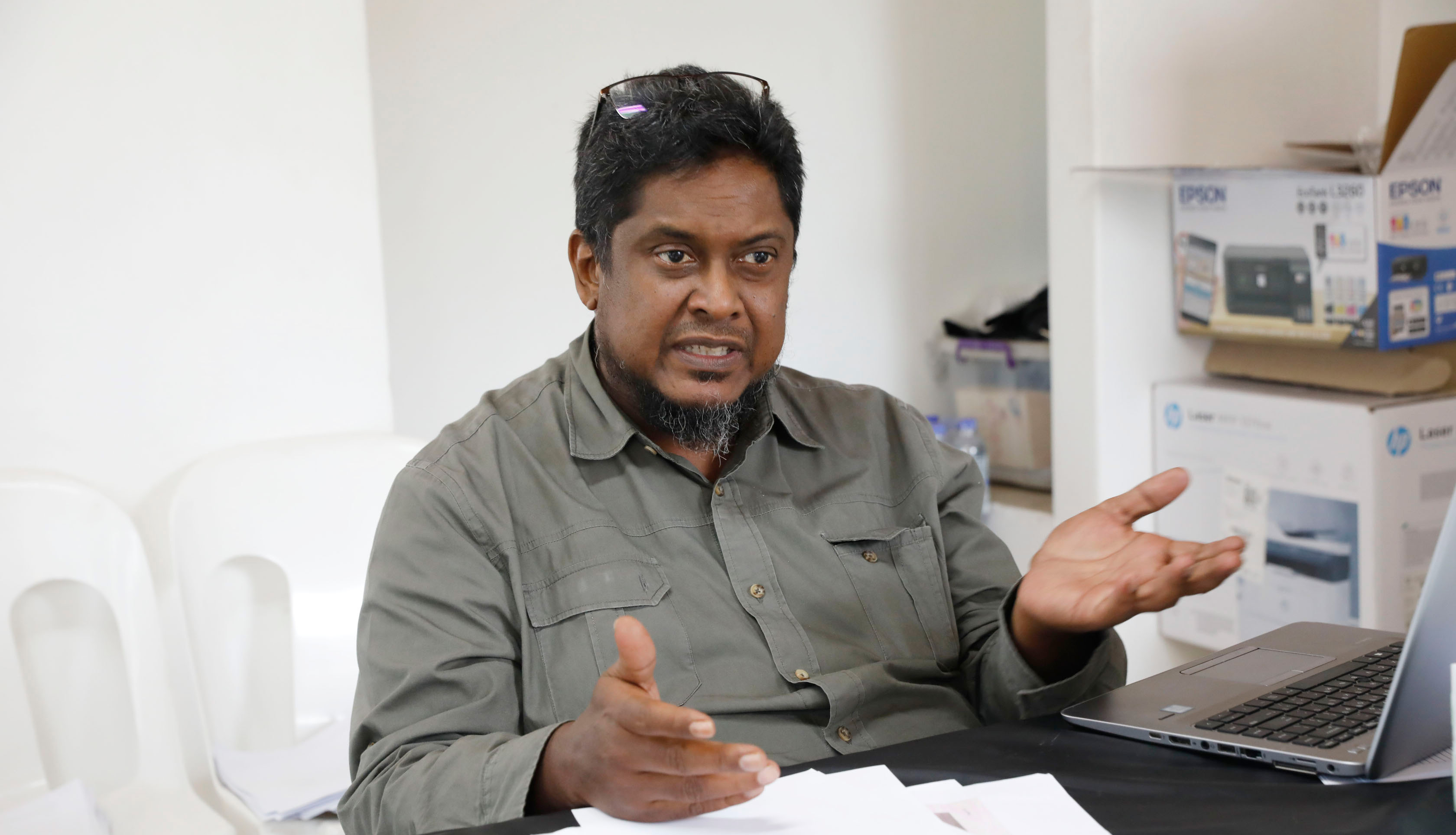POWER OF THE PEOPLE
Civilians spearhead eThekwini ratepayers’ revolt in bid to fix municipality and set up oversight of public purse

Meet the active citizens behind the protest movement leading a rates boycott while the eThekwini Metropolitan Municipality fumbles its finances and service delivery. They call themselves amateurs, but they’re getting things done.
If the average Durban municipal office had a smidgen of the energy found in the headquarters of the eThekwini Rates Protest Movement, Mayor Mxolisi Kaunda and his council wouldn’t have to give a fig about Asad Gaffar (51).
Alas, that is not the case, which is why the civic campaigner is spearheading a rates boycott and slugging it out with the municipality in court. Gaffar’s day job is being a salesman. He flogs fast-moving consumer goods, but he’s not a slick dude with a flash smile and lots of cologne. He has probably never read Dale Carnegie’s How to Win Friends and Influence People.
But he has amassed a bit of a following. Not with snappy jokes or the polished one-liners you’d expect from a salesman, but rather because he’s trading in huge discontent with the eThekwini municipality.
It’s not a happy story and Gaffar scowls, chugs on a cigarette, and often excuses himself to answer his cellphone. Calls are quick and to the point, a bit like he’s processing an order for mielie meal or any other food item he sells when he’s not fighting with Kaunda.
Luckily for Gaffar, his protest movement isn’t one man and a fax machine.
There is a bustle in the front room of a house in the working-class neighbourhood of Sydenham, where Gaffar and his group of volunteers have set up shop. Their makeshift office has been offered rent-free by a patron.
The small room has plastic chairs, trestle tables, a printer, paper cups and a coffee machine. Gaffar, Rose Cortes, Mahommed Peer, Warren Manning, Poovie Pillay and Enzo Gallo carry on a steady banter.
Since the Westville Ratepayers’ Association – of which they are founder members – declared a dispute with the municipality, 20 organisations have joined and the inititative has morphed into the eThekwini Rate Protest Movement. Its logo is a fist in the colours of the national flag and features the words #ourcitymatters.
As of last week, 17 days into their rates boycott, eThekwini residents have withheld R704,000 in municipal taxes from the city, electing instead to put the money into an account managed by Gaffar and his colleagues. In meetings with Kaunda and senior officials, Gaffar is brusque, bordering on rude. He’s not one to stand on ceremony and he doesn’t have an appetite for long speeches.
At a recent meeting with the mayor and some council members in Westville, Gaffar had words with speaker Thabani Nyawose, who accused the movement leader of trying to bully him.

The Westville Ratepayers’ Association offices in Sydenham, Durban. From left are Rose Cortes, Poovie Pillay, Enzo Gallo, Warren Manning and chairperson Asad Gaffar. (Photos: Mandla Langa)
Chipping in
There is a buzz in the spartan office of the protest movement. Think United Democratic Front or trade union office in the early 1990s, sans the Struggle art.
A cheap packet of chocolate biscuits does the rounds while the volunteers focus on documents and prep for the movement’s court cases against the city. They reply to phone calls, emails, WhatsApp messages and random enquiries with a hurried air of efficiency. They defer to Gaffar, but he’s no boss.
“Asad definitely pulled us together,” Cortes says while printing documents, “but there is no hierarchy here. Everyone chips in. And there has been an almost divine intervention in this thing. We have been helped by so many people at every turn.”
Gaffar hails from Ladysmith, where he also rallied ratepayers without any political affiliation. In Durban, the governing ANC might have invoked the ire of residents because of its mishandling of the city’s budget and poor infrastructural maintenance, says Gaffar, but the movement’s laser beam is on fixing the administration. Regime change may be a useful byproduct but is not the aim.
The ANC’s preferential tendering policies are a consequence of the party’s “radical economic transformation”. It has corrupted public spending.
Gaffar says the city will cluck sympathetically and meet ratepayers, but it won’t accede to the movement’s demand to establish a ratepayer board to oversee tenders. To do so would expose crooked contracts that result in broken water pipes, failing infrastructure and rotten service delivery.
Court action now under way will hopefully prove that the Municipal Systems Act protects disaffected residents involved in a rates boycott from punitive action by a municipality. Gaffar maintains the city can’t disconnect lights, water and other utilities.
Once residents get wind of that, he predicts a groundswell of support.

A dilapidated building on University Road in Durban that is occupied by vagrants shows the collapse of services in the city centre on 22 June 2022. (Photo: Phumlani Thabethe)
Setting an example
Concerned citizens have generously backed the movement. It is not a fortune, Gaffar says, but donors have forked out at least R600,000 for legal fees. The R7o4,000 that “brave” boycotters have withheld is in an account with five signatories and has a host of protocols to protect it, including that its sole beneficiary is the municipality.
The movement has some wealthy patrons who would probably prefer to remain anonymous, but as a registered nonprofit it has to produce a report at its annual general meeting with fully transparent financials noting all donations.
“We’re building a glass house,” Gaffar says, “like we want the municipality to be. We can’t hold the municipality to one standard and expect another for ourselves. Financial transparency is at the core of our demand.”
So, who is behind the eThekwini Rate Protest Movement? “We’re a bunch of amateurs,” Manning chuckles, drawing wide smiles from the others. “But we are committed to democracy and transparent government. And we have access to the expertise to fix the city.”
Some Durban residents would argue that even a bunch of amateurs could run the city better than it is being run now. Borrowing and misspending are at unprecedented levels. Almost 60% of the city’s water is lost to leaking pipes and accounts for almost R2-billion of its R65-billion budget.
If the movement’s wishes could come true, it would prioritise the civilian oversight of spending and immediately set about fixing the water leaks. Some residents have had no running water for three years, whereas others have daily outages of up to 12 hours.
The contractors aren’t fixing the leaks properly, yet Gaffar says there is a working example of a public-private partnership in Durban that could be copied to improve water supply immediately. The pulp and paper producer Mondi has an agreement with the city to recycle water from its Merebank plant.
If civilian oversight was given just to fix the city’s waterworks, it could save billions and bring dignity to hundreds of thousands of struggling residents.
Every week the movement gets calls from residents in Clermont, Chesterville and Umlazi. “These areas are worst affected and they don’t have a voice. This isn’t about ratepayers in Westville.
“The city says give us money to fix the problems, especially in underserviced areas, but then they don’t. Instead, they bullshit us. We can’t let them carry on wasting our money,” says Gaffar.
Sceptics and followers
Terri MacLarty, chairperson of the Umhlanga Ratepayers’ Association, says the organisation has advised its members not to join the boycott, though it understood the movement.
“People are ready to withhold their rates, but the boycott is illegal. Umhlanga ratepayers own property worth R100-billion and contribute 38% of the city’s rates. We have been asking to meet the mayor for two months and this week he finally agreed.
“We want to see proper plans for the repair of infrastructure,” says MacLarty. “Corruption and irregular spending are out of hand and we have to see how we can fix this. We have experts who can help the city. We need better oversight of the public purse. We need to inspect every city contract.”
S’bu Zikode, president of the shack dwellers’ movement Abahlali baseMjondolo, endorses the boycott: “Rates are the only bargaining power that ratepayers have. If the city’s revenue does not benefit ratepayers, then what is the point of paying rates?
“There is no service delivery, the infrastructure is collapsing. Corruption and political gangsterism have taken over. Paying the city is almost like feeding political mafias,” says Zikode.
Cortes says the eThekwini Rate Protest Movement is made up of “extreme patriots”.
“We love this country,” she says. Manning agrees: “We have nowhere else to go. We have to make it work.”
Gallo adds: “And you fix things from the bottom, not the top.”
Though the numbers involved in the ratepayers’ boycott may not be of huge significance relative to the city’s budget, the timing of it is significant, as the protest attracts more attention.
There was an uproar last week when the ANC voted to pay city manager Musa Mbele an annual salary of R3.9-million, almost as much as President Cyril Ramaphosa. The party also sought council approval for almost R11-million for staff awards, a picnic and a hip-hop festival. “This is beyond ridiculous,” says Gaffar.
Read more in Daily Maverick: eThekwini upgrades metro boss’ salary by 66% in less than a year as city falls further into decay

Residents of Koster protest in 2014. Locals took to the streets over poor service delivery and stormed municipal offices to hand over a memorandum. (Photo: Bongiwe Gumede / Gallo / Foto24)
Ratepayers are doing it for themselves
The ANC might describe ratepayers as revolting, but in the words of Aretha Franklin they are “doing it for themselves”.
The ratepayer revolt in eThekwini is getting lots of attention because it is probably the biggest city in the country where the national governing party still has a majority and relatively unfettered control of the public purse.
All eyes are on court action by eThekwini ratepayers who want legal protection for their rates boycott, but a court hearing is set for 1 November and the matter isn’t likely to be concluded soon thereafter.
In the meantime, the complainants are looking around the country for cases that could contribute to legal precedent. Two, in Koster and Kokstad, might be helpful.
Kokstad is a village in the foothills of the southern Drakensberg where the municipality recently suffered an embarrassing blow in court.
Ratepayers spent four years and R3-million in legal fees but won a case in the KwaZulu-Natal Division of the High Court in Pietermaritzburg against the governing ANC raising rates by a whopping 50%.
It is a bit more complicated than it sounds but, in essence, the town introduced a new valuation roll in 2018, increasing the total value of properties by 173% from R4-billion to R11-billion. The impact for residential and commercial property owners was a 50% rates increase from 2019. In some instances, rates increased by between 300% and 1,000%.
A supermarket went from paying about R50,000 a month in rates to R120,000.

Ratepayers at a meeting with eThekwini Mayor Mxolisi Kaunda and council speaker Thabani Nyawose. (Photo: Greg Ardé)
“The ANC said it is our way or the highway,” explains ratepayer chairperson Rudolf Erasmus.
Ratepayers got together and tried to resist, with limited success. Some tried to pay the average of their 2018 rates plus a 6% increase and declared a dispute with the municipality, but their services were disconnected. It all ended up in court.
On 27 July, the high court denied the municipality leave to appeal the judgment it had lost. The judge said, when dealing with accountability issues, the courts play an oversight role.
The Kokstad council submitted that municipalities were not accountable to the courts, which could not interfere with their workings. This, the court ruled, was “misplaced”. There was no impediment to the courts providing remedy where local government “blatantly and repeatedly” flouted provisions of the Rates Act with regard to public participation. Municipalities, the court said, could not “ignore the public’s input”.
Erasmus said former Kokstad mayor Bheki Mtolo, now ANC secretary in KwaZulu-Natal, had vowed to fight ratepayers in court using their own money.
But he lost. Erasmus said a largely new crop of municipality managers had shown willingness to engage with the public. However, this week he got news that the municipality was going to the Supreme Court of Appeal to try to overturn the ratepayer victory.
“Municipalities are not above the law. Our action has proved that. It has cost a fortune and has taken a toll on everyone’s health. But R3-million in legal fees could save ratepayers R460-million over nine years. My advice to others is to hunker down and lawyer up,” said Erasmus.
“Google the term ‘daylight robbery’. It emanates from England where in 1696 the king introduced a tax to get more money out of residents who had more than six windows. Some people resisted and boarded up their windows. It was literally a tax on daylight. So, what we are experiencing may be very uncomfortable, but it’s a global phenomenon and it’s not new.”
Koster is a small town in North West, falling under the Kgetlengriver Municipality. There, concerned citizens got lawyer Adreas Peens to represent them in the magistrates’ court and got a ruling allowing them access to the water treatment works so they could get it running again after it had been shut down during a municipal workers’ strike. The court granted them access, and the water supply was restored. Residents of Mafube Local Municipality in the Free State took similar legal action.
The water and rates issues are not the same, but do underscore the point that local government has to include residents in decision-making.
In a North West Division of the High Court ruling in 2018 it was ordered that rates and taxes were levied unlawfully by the Kgetlengriver Municipality between 2010 and 2014 . The valuation rolls were declared unlawful. Peens said the matter was on appeal.
He said, based on the court order, some residents were withholding rates as the municipality owed them money.
“Without a court order, you are at risk when you are withholding rates, because you need a proper dispute in terms of Section 102 of the Municipal Systems Act.”
In the eThekwini case on 1 November, ratepayers will seek to interdict the city from cutting off water and electricity supply to rates boycotters pending finalisation of a dispute lodged by the ratepayers in June.
The ratepayers say the municipality’s budgetary public participation process was flawed. Beyond that, court papers say, the Auditor-General’s concerns about the municipality have not been addressed and unauthorised, irregular, fruitless and wasteful expenditure losses in 2021/2022 amounted to R427-million.
The city, ratepayers add, failed to take action against those responsible for the losses, even after an additional loss of R346-million owing to a “repeat transgression”. They say that R2-billion a year in water losses represents a gross failure to address losses other than imposing higher tariffs. And the Auditor-General’s report highlighted electricity losses of R1.3-billion.
Ratepayers maintain they have not been engaged about these losses in spite of repeated requests from them to do so.
When Mayor Mxolisi Kaunda finally did engage them, he did not agree to protect their rights in a bona fide dispute.
The purpose of rates is to ensure facilities are run efficiently, ratepayers say, and these rates must be lawfully introduced and involve community participation. Budgets cannot be decided unilaterally. There is no other remedy or recourse than to approach the courts, they say. DM
This story first appeared in our weekly Daily Maverick 168 newspaper, which is available countrywide for R29.






















Well done. Inaction is no option.I support them 100%.
South African democracy ….. government for itself at the expense of the people!
The only money government has comes from someone’s tax. Is it also time for a legal challenge to set a precedent that holds government decision makers personally accountable for legal fees when they use this money to defend clearly unwinnable court challenges with the sole purpose of using Stalingrad tactics to defend their, at best in-competence, at worst blatant theft!
I agree.
I’ve said it before, and I’ll say it again: the only way to get rid of these dreadful people in the ANC is to cut off their resources, financial and otherwise. Well done to the Durban ratepayers who have the courage to take action. Now, when will we start in Johannesburg and Gauteng?
Viva these brave protesters!
Now change the thieving government!
Well done. We need more of this across the country.
Take your collective heads out of the sand Umhlanga…
Well done, Durban!
More and more, the incompetence and corruption of the incumbents is being exposed.
I look forward to this happening all over the country. We won’t be able to get rid of the ANC just through the polls. They may well do a ZANU-PF on us. Everyone has to get involved. That’s you and me.
I’m already involved. What are YOU doing?
This is an example of the very corrupt ANC and its appointees trying to rake in as much money as they can steal before they are hopefully removed from office
Why do I see no comment from black South Africans, and they do read this? We all share this country and the miserable state of affairs at eThekwini Municipality and elsewhere is a FACT. If you don’t raise your voice, it amounts to condoning the status quo. We saw that very same attitude from white folk during the Apartheid era. Condonation of that which we know is blatantly, wrong seems to be a national disease. For god’s sake, let us learn from the past.
im guess is that DM + MG for that matter have a very very low black middle class readership.
Am a fan of mass action . load what you can for electricity , stop paying rates etc !
3 months , chaos !
What can the munis do with 100 k + non payers ?
Mooted it years ago , little response !
On a positive note, I have noticed progress from the Municipality in this area recently which is encouraging – more roadside clean ups, potholes being filled,traffic police presence ( although the number of unlicensed vehicles still grows in this ward and up theNorth coast!) but I’m still confused as to what these activists specifically want? If they were more focused on specific points they might get more support. I also wonder who and how they chose the auditors to manage the Trust account. Was it by general consensus or the choice of the gentleman who started the class action. Hopefully those leading this action are squeaky clean themselves otherwise it would be a bit like the pot calling the kettle black!
Well, Mr Gaffar says that they’re 100% open to inspection. So, give him a shout an ask.
Brilliant! It’s about time!
Ethekweni Council is a disgrace. Just a centralised feeding trough for the cadres, friends and family. No accountability for anything. Just talk, talk, talk. Glad I moved to the Western Cape many years ago.
And is the mayor definitely going to take heed of your concerns, Mr MacLarty?
The only things the ANC understand is that they don’t have to give a toss about anybody but themselves, their black BMW’s and big houses. Do you really think he’s going to leave the room after his meeting with a bunch of rich boys and reflect upon his ineptitude? You’re misleading your members. Good one, Asad! Hit them where it hurts most!